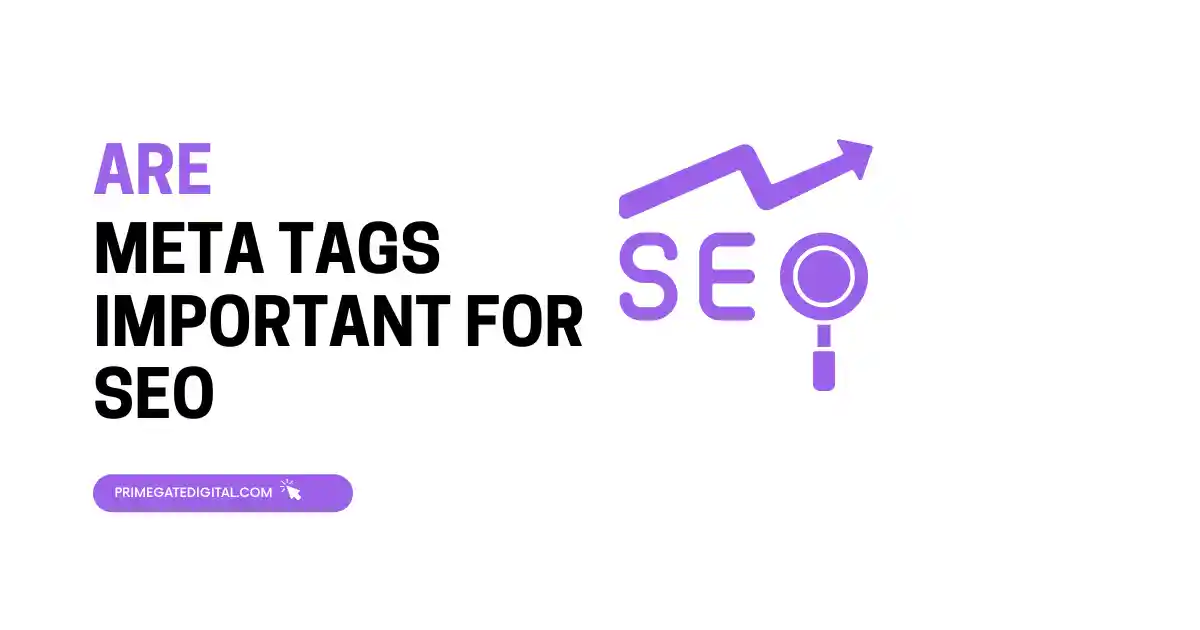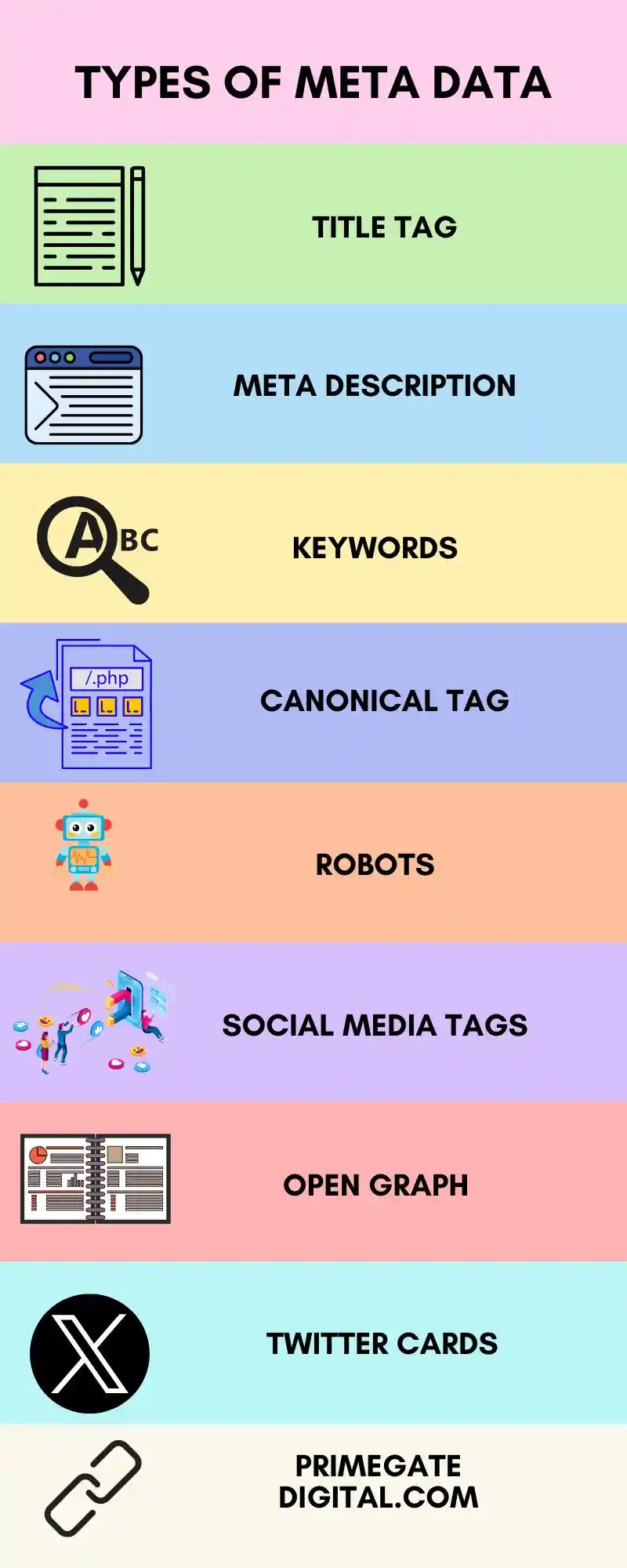Last updated on December 10th, 2023 at 07:30 pm
Meta Tags are important because they determine the way your site shows up in the search engine results pages.
They can also encourage people to click on your website. This implies that they can affect your traffic and engagement rates, which can make or mar your rankings and SEO.

According to Google,
“The meta tag contains information about the document. Google understands a standard set of meta tags. You can use custom meta tags to provide Google with additional information about your pages. Google can use this information to create rich snippets or enable sorting of search results.
This is why you have to make meta tags an element of your SEO strategy. Even though some tags do not directly affect your rankings, they can influence the way your website looks within the online realm.
Furthermore, meta tags can impact several non-traditional areas, such as Google image search, voice, knowledge graph, etc. You shouldn’t ignore them when creating your page.
What are Meta Tags?
The most basic meaning of the word “meta” is above, after, or transcend. It originated from the Greek language.
In the same way “metaverse” describes a world that transcends our corporeal universe, meta tags also transcend the content you can access on web pages.
Meta tags are HTML snippets of code that you implement in your site’s header to offer further information.
If you do not have coding expertise, this may seem a bit more technical than it really is. Many site builder tools today have features that allow you to input meta tags without coding requirements.
They can make things as easy as your site title, which anyone can access in your browser’s header, or the site description that anyone can find on search result pages.

Types of Meta Data
Metadata exists in several kinds, with all of them serving different functions, and you can find them in different positions.
Let’s explain several important metadata for your site’s optimization.
Title Tag
The title tag is usually found in the upper part of the browser window. It can also be seen on the search engine results pages.
This is the most crucial meta tag since it offers primary details to search engines on the topic of your page.
Title tags can have an impact on your CTR (click-through rate). The reason for that is that they entice someone to click on your page when seeking specific information.
So, you need to ensure that your page title is descriptive and that you have added relevant keywords.
Meta Description
The meta description is a highly essential feature for improving your CTR.
It expands your title to offer a short summary of what users would desire to see whenever they access your website.
The meta description has to be simple and brief. It should precisely showcase the content of your page. It shouldn’t be clickbait.
Keywords
Meta keywords are categorized as keywords that have relevance to your page.
Meta keywords are keywords that have a relationship with your page. You shouldn’t be too concerned about meta tags.
They do not influence your site’s position on SERPs. They have gone to obscurity in the same way as link farming and private blog networks.
While keywords are a very relevant aspect of SEO, they shouldn’t be forcefully inserted into meta tags; instead, they have to be naturally added to your content.
Canonical Tag
Canonical tags are used to point search engines to the “main” version of a page where there are duplicates or pages similar to it.
At times, you may unintentionally create duplicate pages. For instance, you can change the URL structure and may not remember to get rid of all pages that have the old URLs.
You may also have a site layout that repurposes content using individual URLs. This is usually the case with product pages.
When you discover duplicate pages, with the use of a canonical tag, you can protect your main page from negative SEO impact.
You don’t just add canonical tags randomly; they simply assist search engines in determining the best way to assess your website.
Robots
The robots tag is used to inform search engines to index and crawl a specific page. It helps you limit the visibility of some pages on search engines.
This tag is ideal for allowing search engines to determine their crawl rate on your site. You might have to work towards boosting the crawl rate if your site is updated on a frequent basis.
Robots have an impact on links. For instance, you can use “follow” or ‘nofollow” tags on links. This is particularly important for link-building.
Social Media Tags (Open Graph and Twitter Cards)
Social media tags allow you to manage and optimize the appearance of your webpage on social media platforms.
There are two kinds of tags, namely Twitter Cards and Open Graph.
While Twitter Cards is exclusively used for Twitter, Open Graph is used for other social media sites like LinkedIn, Pinterest, and Facebook.
One thing to note about social media tags is that they don’t have a direct effect on your search ranking.
But they can impact your click-through rate on social media. If you have powerful social media visibility, it can be a source of traffic to your page, boosting your rank over time.
Are Meta Tags Important for SEO?
Meta tags can positively affect SEO in many ways. Adding relevant keywords to your meta description is crucial. It has the quality to improve your click-through rate, which boosts your organic traffic.
Canonical and robot tags engage with search engines and inform them what they should do on your page.
Do Meta Tags Influence your Ranking?
The answer is yes.
Search engines have a huge preference for properly structured websites, and when you utilize meta tags well, they can serve as a crucial element. When not properly used, it will negatively affect your SEO.
Meta tags also offer important details about your page, which will convince someone to click or not.
The better your click-through rate, the higher your ranking
How Search Engines Utilize Meta Data
Canonical and robot meta tags assist search engines in evaluating a site. The description tags and title showcase information to users on search results pages.
In the picture below, the title tag is shown in blue. It has a bold font that gives it a distinctive look. You can also check out the meta description.
It has keywords that align with the search term, which helps users determine if they cater to their search intent.
Click-Through Rates
Click-through rates measure how many people have clicked your link divided by the number of people who have seen it on the search results page.
Your meta description and tile are important elements that can influence your click-through rate.
Ensure that they are brief, descriptive, and captivating enough to motivate someone to click on your page instead of ignoring it.
Technical SEO
When properly used, meta descriptions and title tags can improve your rankings on SERP.
Robot tags and canonicals are very important for technical SEO because they can prevent critical problems from occurring.
Best Practises for Meta Data SEO
Just adding meta tags to your pages is inadequate. You have to ensure you adhere to best practises. This will optimize them for the best performance.
Below are some straightforward instructions that will help you reap the benefits.
How to Create Optimized Meta Titles
Brevity is important: Search engines only display a minimum of sixty characters of your page title. Ensure you don’t exceed this limit.
Add relevant keywords: You have to add relevant keywords since it is the initial element your prospective visitors will see. It shouldn’t be ambiguous or irrelevant to the content of your page. It has to give search engine information about your page topic.
Keep page titles unique: Duplicate meta titles can be a major problem, especially if you have numerous pages. So keep your page title unique and relevant to its page.
Crafting captivating Meta Description for SEO
Keep it short and simple: Meta descriptions have a character limit of 160.
Add relevant keywords: This should be your chance to add keywords. Include your relevant keyword. Don’t forget this.
Write naturally: Like your content, ensure your meta description is natural. Don’t forget that it will be accessed by search engines and humans.
Desist from Keyword Stuffing: You might think overloading your meta descriptions with keywords will get you results. This is false. It will get you penalized. Don’t try to force keywords into your meta descriptions or titles. Be sure to keep them as human-written and relevant to your topic as possible.
FAQ
Yes, they are still a vital SEO element. However, you still have to pay attention to the quality of your content and user satisfaction.
How can I use meta descriptions to add value to my SEO?
- Ensure it stays below 160 characters.
- It should be an overview of each individual page.
- Keep your meta descriptions unique.
- Be brief, relevant, and descriptive.
- Align with the search intent.
Yes, it can. Meta tags are important HTML elements that have a tremendous impact on your page’s performance on SERPs.
Conclusion
Now that you have understood the importance of meta tags in SEO and site ranking, be sure to follow our guide to reap the benefits.
 PrimeGate Digital is a Result Driven Blog that strives to go beyond ‘Conventional Digital Marketing’ through digital innovation and performance marketing. We have experience working with world class brands and products.
PrimeGate Digital is a Result Driven Blog that strives to go beyond ‘Conventional Digital Marketing’ through digital innovation and performance marketing. We have experience working with world class brands and products.

